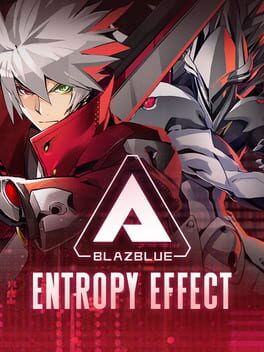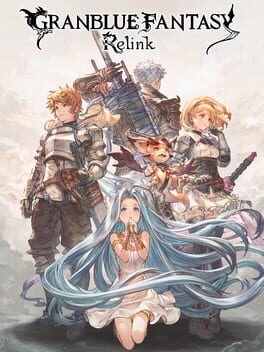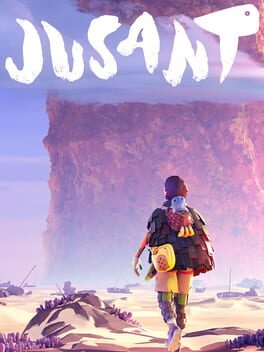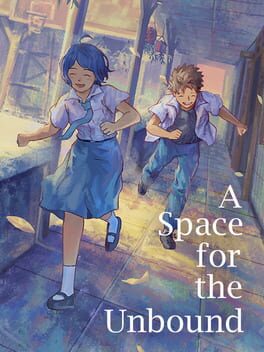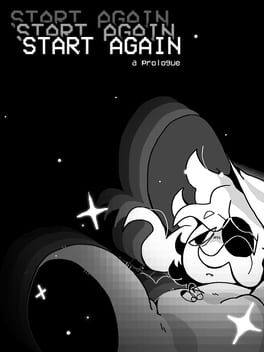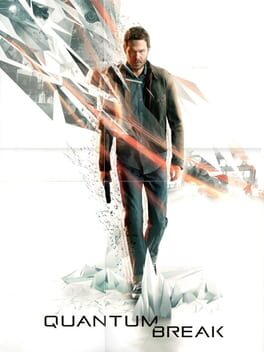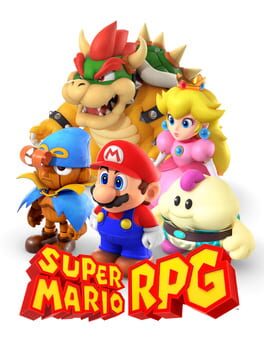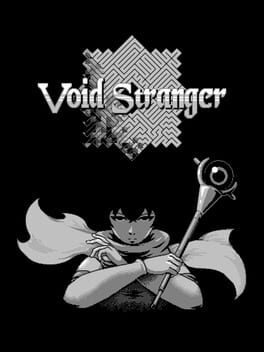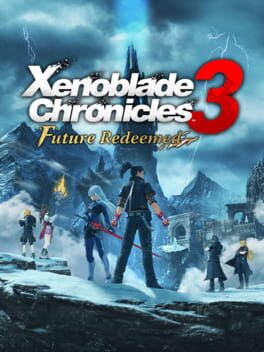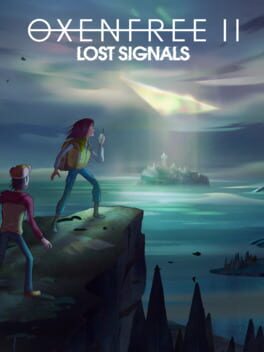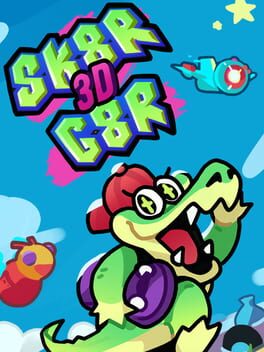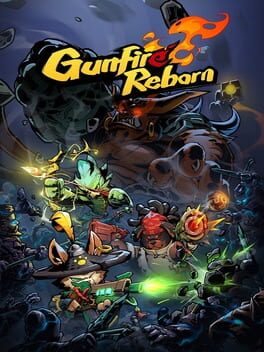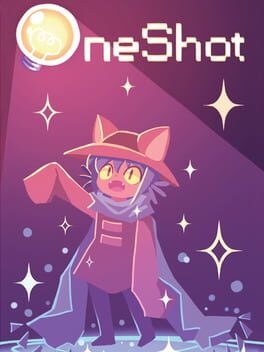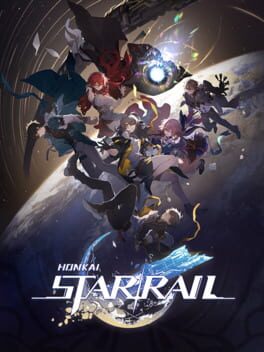JackLeveledUp
Unamazing, but definitely fun. I love that it takes the fantasy of playing these characters and explores that in a highly approachable, hack-and-slashy context. Unlocking characters is weirdly grindy, though, and the gameplay isn't quite varied enough to me to sustain that grind without those character unlocks, so I'm tapping out after a few early full clears.
Relink can be astoundingly good as a fast-paced boss fight action game, but it's not without issues. Before you see any of its best encounters, it'll test your loyalty with a mediocre 15 hours of story (blocking all meaningful co-op play) as well as some extremely unintuitive build paths and progression methodology (save scumming, critically important but unexplained loot traits, red herring grinds, etc). Some of the weird end-of-the-endgame stuff has soured me a little, but I loved this game enough to play over 100 hours in a month, and that's not normal for me.
Here's the best way I can explain the appeal of this game: do you want to fight giant anime dragons? Do you want to hear songs like this while you do that? Obviously you do, right?
Here's the best way I can explain the appeal of this game: do you want to fight giant anime dragons? Do you want to hear songs like this while you do that? Obviously you do, right?
2023
It looks great, the soundtrack is pretty, and the climbing feels mechanically comfortable, yet physical and realistic. Shouldn't I be having a good time?
I think something about this level design is so unsettling. I'm perpetually haunted, wondering whether I'm going "the right way," or towards a collectible I'm not really invested in, or on a fool's errand down some decorative, diegetic dead end. I made it to Chapter 3 when the frustration finally overtook me.
I think something about this level design is so unsettling. I'm perpetually haunted, wondering whether I'm going "the right way," or towards a collectible I'm not really invested in, or on a fool's errand down some decorative, diegetic dead end. I made it to Chapter 3 when the frustration finally overtook me.
2016
In the aftermath of Alan Wake 2 and Control, there is a real "sophomore project" energy to Quantum Break. It's an almost obnoxiously of-its-time cinematic action shooter, complete with all of the requisite platforming jank and pixel hunting for too many hidden collectibles ("narrative objects," a name that's as great as it is bad).
Unfortunately, and evidently: this game was published by a version of Microsoft Studios that needed to sell the world on their Xbox One hardware and their bizarre vision of a directly television-inspired gaming medium. This narrative's "mass market" tone, casting, and "cool and detached" characterization felt so distracting to me. I sorely missed that "self-serious yet extremely not at all" demeanor that Remedy are known for. That said, what a gift it was to have Lance Reddick in here. Holy shit was he exactly as good as always in this! I miss him so much, still, as I'm sure all of us do.
Despite all of that, there is something here. The theming IS compelling, and zipping up to time-slowed enemies to blast them with a shotgun felt cool every time. I played with a controller, and the aim assist clearly kicks in when you quick scope...so that almost became its own mechanic to me. I'd blip about each arena, briefly stopping to pop shots while hammering the left trigger to "aim bot" my way through every fight. It felt right. But I don't know - unless you're a Remedy historian, maybe you should just go play Vanquish.
Unfortunately, and evidently: this game was published by a version of Microsoft Studios that needed to sell the world on their Xbox One hardware and their bizarre vision of a directly television-inspired gaming medium. This narrative's "mass market" tone, casting, and "cool and detached" characterization felt so distracting to me. I sorely missed that "self-serious yet extremely not at all" demeanor that Remedy are known for. That said, what a gift it was to have Lance Reddick in here. Holy shit was he exactly as good as always in this! I miss him so much, still, as I'm sure all of us do.
Despite all of that, there is something here. The theming IS compelling, and zipping up to time-slowed enemies to blast them with a shotgun felt cool every time. I played with a controller, and the aim assist clearly kicks in when you quick scope...so that almost became its own mechanic to me. I'd blip about each arena, briefly stopping to pop shots while hammering the left trigger to "aim bot" my way through every fight. It felt right. But I don't know - unless you're a Remedy historian, maybe you should just go play Vanquish.
2023
It's hard to find an RPG that prioritizes innocent fun as much as Mario RPG does. ArtePiazza's remake carries that spirit forward and adds enough modern usability niceties that I can't imagine any reason to play the original instead.
There are some things that struck me this time around: how it instantly throws you into the action, how efficiently it works through character arcs, and the almost obscene variety of mini games. Honestly, so many RPGs feel less complete after 40+ hours than this game feels in like twelve.
There are some things that struck me this time around: how it instantly throws you into the action, how efficiently it works through character arcs, and the almost obscene variety of mini games. Honestly, so many RPGs feel less complete after 40+ hours than this game feels in like twelve.
2023
An endlessly surprising "sokoban"/tile-based puzzler that builds entire mechanics out of "cheating."
By this point, though, there are a lot of games that get treated like: "oh you just gotta play it, it's so special and unique, I can't possibly talk about it, just trust me bro." So I want to try to be more specific about what works, if that's something you want to hear.
For one, the puzzles are great, and it cycles through different mechanics quickly enough that you shouldn't ever feel too stumped for too long. There are some clever and opaque tricks involved with the difficulty balancing and "fail states"...so try not to worry about failure at all. And I think if you play it, you'll find yourself continuously shocked by how far they are able to push the tile-based puzzle format.
The story feels appropriately minimalist at first, but it gradually becomes more layered alongside the mechanics. I should note that it's extremely character and lore focused - possibly my main nitpick of this game is that there isn't more of a pronounced central message in play. But there are several character moments that I was moved by, and at times it hits hard enough that you might even forget that you're playing a puzzle game. It's impressive exactly how well it's all thought out, too, because visual and mechanical symbolism are alllll over this game.
The complexity develops gradually over the course of the game, but it reaches such a point where it can actually be hard to determine how to progress. For some people, I think that could be an exit point...but to me, it became extremely satisfying to test hypotheses, revisit the things I hadn't quite figured out, and eventually: discover what I was missing. I do wonder how these moments will feel when the game becomes "more known," and when there are clearer guides on how to see everything this game has to offer. All of that is to say, if this seems like something you're interested in, I think the sooner you play it, the better it'll be.
By this point, though, there are a lot of games that get treated like: "oh you just gotta play it, it's so special and unique, I can't possibly talk about it, just trust me bro." So I want to try to be more specific about what works, if that's something you want to hear.
For one, the puzzles are great, and it cycles through different mechanics quickly enough that you shouldn't ever feel too stumped for too long. There are some clever and opaque tricks involved with the difficulty balancing and "fail states"...so try not to worry about failure at all. And I think if you play it, you'll find yourself continuously shocked by how far they are able to push the tile-based puzzle format.
The story feels appropriately minimalist at first, but it gradually becomes more layered alongside the mechanics. I should note that it's extremely character and lore focused - possibly my main nitpick of this game is that there isn't more of a pronounced central message in play. But there are several character moments that I was moved by, and at times it hits hard enough that you might even forget that you're playing a puzzle game. It's impressive exactly how well it's all thought out, too, because visual and mechanical symbolism are alllll over this game.
The complexity develops gradually over the course of the game, but it reaches such a point where it can actually be hard to determine how to progress. For some people, I think that could be an exit point...but to me, it became extremely satisfying to test hypotheses, revisit the things I hadn't quite figured out, and eventually: discover what I was missing. I do wonder how these moments will feel when the game becomes "more known," and when there are clearer guides on how to see everything this game has to offer. All of that is to say, if this seems like something you're interested in, I think the sooner you play it, the better it'll be.
For a lot of this expansion, I felt like the plotting was a bit too dense for the new characters to have any room to breathe, but the good news is that they really freaking stick the landing. It ends up as this beautiful tale of what it looks like to take responsibility and try to change the world for the better. This theme is meaningfully expressed on its own, but the more history you have with "Xeno" games as a whole, the harder it's going to hit.
Not to mention: the soundtrack is peak, the open world RPG design is peak, the new progression systems peak...at this point, Monolith Soft are legitimately in a class of their own.
Not to mention: the soundtrack is peak, the open world RPG design is peak, the new progression systems peak...at this point, Monolith Soft are legitimately in a class of their own.
Lost Signals follows a shockingly small main cast: mainly two adults on a world-saving mission while they're neck-deep in their own problems. It's quite the departure from the first game's "five teens on a beach with some weed brownies and a spooky cave."
Over time I grew to like Riley, when her real character motivation was finally revealed late in the story (why is this held back for so long??). Jacob, on the other hand...I never really felt anything positive for. He's a constant bummer! I understand what they're going for, but he's hardly the kind of person you would want chatting at your back while hiking through the woods for work at 3am. It certainly would've helped if we had some other context or character to switch their interactions up.
It at least ends well, and I respect that the team seems to have wanted to make something other than "back at it again on Edwards Island with 5 more teens!" It's just disappointing that it feels so far from succeeding in the things that the first game was commended for.
Over time I grew to like Riley, when her real character motivation was finally revealed late in the story (why is this held back for so long??). Jacob, on the other hand...I never really felt anything positive for. He's a constant bummer! I understand what they're going for, but he's hardly the kind of person you would want chatting at your back while hiking through the woods for work at 3am. It certainly would've helped if we had some other context or character to switch their interactions up.
It at least ends well, and I respect that the team seems to have wanted to make something other than "back at it again on Edwards Island with 5 more teens!" It's just disappointing that it feels so far from succeeding in the things that the first game was commended for.
2023
2020
2016
Niko smol bean etc etc -- yes, for sure, granted. It was a bummer for me, though, that he and especially some of the other characters lacked the agency and dynamism I was hoping for. As someone who is often character-motivated, I found it hard not to make comparisons to...well, no spoilers, but other games that occupy a similar narrative space.
What I do love about it, though: the look, mood & tone, as well as some of the wonderfully inventive puzzles around the halfway mark.
What I do love about it, though: the look, mood & tone, as well as some of the wonderfully inventive puzzles around the halfway mark.
2023
It's fine! I had high expectations of this story, based on what I'd heard about the writing from other Genshin players, but to me it's about the same. The pacing is a little tighter and it's marginally less chatty, but after the first couple arcs I feel like the thematics are way weaker. I actually don't like the main character's detached affectation either? Your mileage will vary.
If I stick with it, it'll be for the flashy animations and styling. The best parts of this game are the quality of life refinements they built on top of Genshin's "service game" foundation. So if you like the look of the characters and you want a free, low-effort, ongoing game to dribble around between the rest of your gaming, this is a solid option, but it's not anything revolutionary either.
If I stick with it, it'll be for the flashy animations and styling. The best parts of this game are the quality of life refinements they built on top of Genshin's "service game" foundation. So if you like the look of the characters and you want a free, low-effort, ongoing game to dribble around between the rest of your gaming, this is a solid option, but it's not anything revolutionary either.
2023
Many of Final Fantasy 16's problems would've been solved for me if it was just an over-caffeinated boss rush. The spectacle on display is incredible, and the vocal performances (particularly Ben Starr as Clive and Ralph Ineson as Cid) are unforgettable. But in what is meant to be a 50-hour epic, the thrill of those brief moments can't mend the utter wreckage left by its narrative.
The plot completely implodes in the final arc, as it swerves from tales of revenge and continent-spanning political machinations to hypersimplistic shonen power fantasy. I even like shonen, but the lack of thematic consistency makes the story's biggest moments feel bizarre and unsatisfying. Worse, it has massive problems with racism and misogyny. The racial representation is either nonexistent or thoughtlessly offensive, and the allegory of slavery driving the plot is embarrassingly shallow and ill-conceived. The women in this story suffer from some of the worst treatment in the history of the Final Fantasy franchise. Even Jill, the deuteragonist for much of the story, is allowed no agency whatsoever despite being the human embodiment of Shiva. She has no on-screen relationship with ANYONE besides Clive! And she's probably the "best" written woman in the game, besides minor, non-player characters that don't have enough scenes or importance to do anything upsetting.
In the grand scheme of 16's disappointments, its gameplay issues are minor to me, but it does gradually become uninteresting to play. You're effectively doing the same 4-hit combo and waiting on cooldowns the entire game. It barely matters what type of enemy you're fighting (or frequently, whether they're a boss or throwaway mob) as there's no "push and pull" type of dynamic: no elemental weakness system, no "wrong" time to attack, no alternative weapons or combos, etc. You push your attack buttons, you dodge once in a while, and eventually you deplete their HP to zero. There's a skill tree, but the upgrades are both infrequent and intangible. I found myself not even spending hundreds to thousands of skill points because I had no possible use for "mastering" abilities. I would think it's fine or even good for a narrative-focused RPG to have straight forward action, but the role playing systems in this game are complete artifice. Forget playing as anyone else, I would love to at least pick my favorite companion to travel with me or something, but you can't even do that.
I know this is not what a lot of Final Fantasy fans wanted this game to be, but I was actually pretty excited to meet this game where it was. Ultimately I'm really bummed to have to join those people as a detractor of this game.
The plot completely implodes in the final arc, as it swerves from tales of revenge and continent-spanning political machinations to hypersimplistic shonen power fantasy. I even like shonen, but the lack of thematic consistency makes the story's biggest moments feel bizarre and unsatisfying. Worse, it has massive problems with racism and misogyny. The racial representation is either nonexistent or thoughtlessly offensive, and the allegory of slavery driving the plot is embarrassingly shallow and ill-conceived. The women in this story suffer from some of the worst treatment in the history of the Final Fantasy franchise. Even Jill, the deuteragonist for much of the story, is allowed no agency whatsoever despite being the human embodiment of Shiva. She has no on-screen relationship with ANYONE besides Clive! And she's probably the "best" written woman in the game, besides minor, non-player characters that don't have enough scenes or importance to do anything upsetting.
In the grand scheme of 16's disappointments, its gameplay issues are minor to me, but it does gradually become uninteresting to play. You're effectively doing the same 4-hit combo and waiting on cooldowns the entire game. It barely matters what type of enemy you're fighting (or frequently, whether they're a boss or throwaway mob) as there's no "push and pull" type of dynamic: no elemental weakness system, no "wrong" time to attack, no alternative weapons or combos, etc. You push your attack buttons, you dodge once in a while, and eventually you deplete their HP to zero. There's a skill tree, but the upgrades are both infrequent and intangible. I found myself not even spending hundreds to thousands of skill points because I had no possible use for "mastering" abilities. I would think it's fine or even good for a narrative-focused RPG to have straight forward action, but the role playing systems in this game are complete artifice. Forget playing as anyone else, I would love to at least pick my favorite companion to travel with me or something, but you can't even do that.
I know this is not what a lot of Final Fantasy fans wanted this game to be, but I was actually pretty excited to meet this game where it was. Ultimately I'm really bummed to have to join those people as a detractor of this game.
